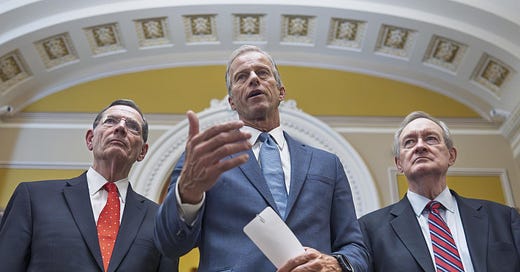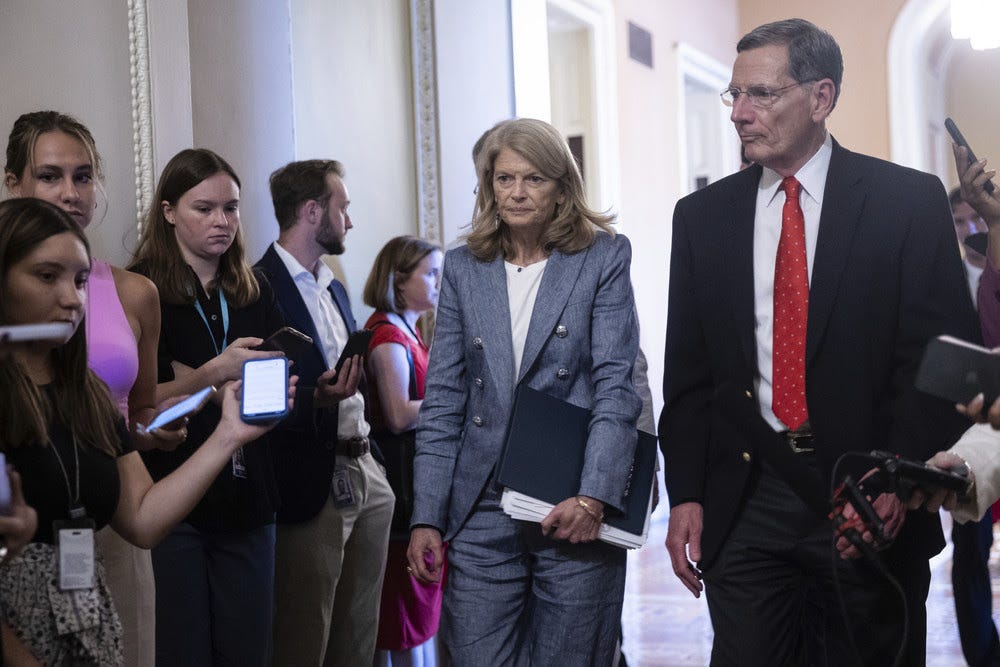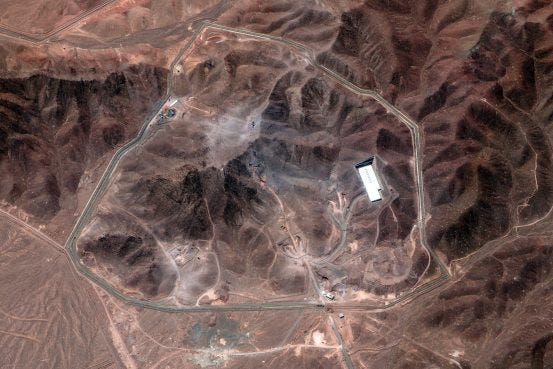Senate Majority Leader John Thune is flanked by Sen. John Barrasso, the GOP whip, left, and Finance Committee Chairman Mike Crapo, after passage of President Trump's signature bill at the Capitol on Tuesday. (AP Photo/J. Scott Applewhite)
What’s in the latest version of Trump’s big bill that passed the Senate
“Republicans are getting closer to the finish line in getting their tax and spending cut bill through Congress with a final House vote possible on Wednesday. At some 887 pages, the legislation is a sprawling collection of tax breaks, spending cuts and other Republican priorities. Read more.
What to know:
Tax cuts are the priority. Existing tax rates and brackets would become permanent under the bill. It temporarily would add new tax breaks that Trump campaigned on. The wealthiest households would see a $12,000 increase in income from the legislation, which would cost the poorest people $1,600 a year, according to the nonpartisan Congressional Budget Office analysis of the House’s version. Middle-income taxpayers would see a tax break of $500 to $1,500, the CBO said.
There were some last-minute changes to the bill. The Senate overwhelmingly revolted against a proposal meant to deter states from regulating artificial intelligence. Republican governors across the country asked for the moratorium to be removed and the Senate voted to do so with a resounding 99-1 vote. A provision was thrown in at the final hours that will provide $10 billion annually to rural hospitals for five years, or $50 billion in total. The amended bill also stripped out a new tax on wind and solar projects that use a certain percentage of components from China.” [AP News]
Senate gives Trump's 'big, beautiful bill' a thumbs up: 5 takeaways
READ FULL STORY→ USA Today
By Eli Okun
THE CATCH-UP
Sen. Lisa Murkowski (R-Alaska) provided the crucial vote to pass the reconciliation bill through the Senate. | Francis Chung/POLITICO
“RECONCILABLE DIFFERENCES: The Senate has passed Republicans’ megabill by the narrowest of margins, bringing President Donald Trump and the GOP much closer to a landmark victory that would lower taxes, beef up border and military spending, slash the social safety net, damage the clean-energy boom, balloon the deficit and raise the debt ceiling.
How it happened: In the end, VP JD Vance cast the tie-breaking vote after Republicans lost Sens. Susan Collins (Maine), Rand Paul (Ky.) and Thom Tillis (N.C.). Majority Leader John Thune managed to keep just enough skeptical moderates and fiscal hawks on board, winning the support of Sens. Lisa Murkowski (Alaska), Ron Johnson (Wis.), Mike Lee (Utah) and Rick Scott (Fla.). More from POLITICO’s Jordain Carney
The scramble to the finish line: The Senate passed the budget reconciliation bill amid a barrage of last-minute policy revisions and debates before the parliamentarian, the tail end of a messy, overnight floor process that set a record as the biggest vote-a-rama in the chamber’s history. Thune told Semafor’s Burgess Everett that making the bill more conservative than the House’s text on Medicaid cuts and other policies was critical to its success.
What’s in: Republicans doubled a fund to shore up rural hospitals against the bill’s Medicaid cuts from $25 billion to $50 billion. (No such luck for non-rural hospitals that could also be affected.) That helped secure Murkowski’s vote, but it wasn’t enough for Collins. SNAP negotiations also slowed cuts for Alaska and a handful of other states. But the changes are ultimately projected to lead to millions of Americans losing food aid. And one new estimate says the bill would cause at least 17 million people to lose their health insurance, erasing a significant portion of the gains since the Affordable Care Act, WaPo’s Yasmeen Abutaleb reports.
Murkowski, who in the end looked to be the crucial swing vote, told reporters that she ‘struggled mightily with the impact on the most vulnerable in this country, when you look to Medicaid and SNAP’ — and that she has urged both the White House and Hill leaders to send the bill to conference. But she said she ‘had to look on balance’ at the whole bill and put Alaskans first.
What fell out: Conservatives’ late effort to reduce federal funding for Medicaid expansion didn’t come up for a vote. The last-minute excise tax on solar and wind energy was removed, though the bill still would unwind significant clean-energy tax credits. And after a GOP deal fell apart, a provision to ban state-level regulation of AI for a decade was removed in a 99-1 vote.
Now back to the House: The revised bill still needs to pass the House again, and voting is set for tomorrow. The Rules Committee plans to take it up quickly today, at 1:30 p.m. The Senate’s deeper Medicaid cuts (cracking down on the provider tax loophole stayed in the bill) could alienate moderates, while conservatives will chafe at the higher price tag. Reps. Ralph Norman (R-S.C.) and Chip Roy (R-Texas) are already signaling they may not be able to vote for the bill. But Republican leaders think they and Trump can muscle it through like they did last time.
From 30,000 feet: Even by Washington’s recent standards, this bill’s huge debt impact — adding $3.3 trillion by one analysis — ‘stands apart in its harm to the budget,’ NYT’s Andrew Duehren reports. The resulting ‘shortfall could begin a seismic shift in the nation’s fiscal trajectory and raise the risk of a debt crisis.’
The politics: Beyond the bill’s potential to change many Americans’ lives and bank accounts, it also constitutes a hard-fought win for Trump and his Hill allies. They pushed through months of fragile negotiations and slim margins to roll most of their legislative priorities into one package, and Republicans will seek to trumpet this as their marquee achievement for the midterms.
But just as eager are Democrats, who plan to wield the bill as a cudgel to flip at least the House next year, emphasizing that its advantages disproportionately accrue to the wealthy while slicing into benefits for the working class. (As WaPo has reported, it may be the largest cut to the federal social safety net in modern history.)
And the feud between Trump and Elon Musk over the bill isn’t over: Trump this morning threatened to use the powers of the federal government to go after his new political enemy, saying the Department of Government Efficiency ‘is the monster that might have to go back and eat Elon’ and that he would ‘have to take a look’ at deporting his onetime right-hand man, per POLITICO’s Irie Sentner. ‘So tempting to escalate this. So, so tempting. But I will refrain for now,’ Musk responded. Meanwhile, James Fishback, a Trump ally and former DOGE adviser, launched a new super PAC to counter Musk’s threats of primary spending, POLITICO’s Sophia Cai reports.” [POLITICO]
ow to get up to speed and on with your day.
Congolese refugees look at the final batches of food delivered by USAID in a storage and delivery area in May. Luis Tato/AFP/Getty Images
USAID
“The dismantling of the US Agency for International Development (USAID), as ordered by President Donald Trump and enacted by the Department of Government Efficiency, has seen funding for thousands of foreign assistance programs frozen or slashed. Now, a new study estimates that the loss of that funding could result in more than 14 million additional deaths by 2030. Nearly a third of those deaths — more than 4.5 million — are estimated to be among children younger than 5. The authors of the study said the effects of the cuts would be similar in scale to a global pandemic or a major armed conflict.” [CNN]
Ukraine munitions
“The Trump administration has paused some shipments of weapons, including air defense missiles, to Ukraine. The decision to halt such shipments comes as Russia has intensified its near-nightly air attacks on Ukraine, often using hundreds of drones and missiles. Since Russia first invaded in 2022, the US has been the single biggest donor of military aid to Ukraine. However, after President Trump returned to power, US support for Kyiv shifted. White House Deputy Press Secretary Anna Kelly said the decision to pause the weapons shipments was made ‘to put America’s interests first.’” [CNN]
Bill sets January 2027 deadline for new Medicaid eligibility rules
“The Senate cleared President Donald Trump's domestic spending and tax cut bill that will enact steep cuts to the nation's safety-net health insurance program for low-income families.
Trump's "Big Beautiful Bill" would cut nearly $1 trillion from Medicaid, the state-federal health program for low-income families and the disabled. The bill is projected to eliminate insurance coverage for 11.8 million people over the next decade, according to the nonpartisan Congressional Budget Office.
•Vice President JD Vance called the Medicaid cuts ‘immaterial’ compared to savings he says the bill will fund through bolstered immigration enforcement.
•How will the legislation cut Medicaid? The legislation would require states to double eligibility checks to twice a year. And states, which administer Medicaid, would have to set up systems to verify a person's employment or exemption status.
•What happens next? The House is scheduled to consider the legislation Wednesday in advance of Trump's self-imposed July 4th deadline for his signature domestic policy legislation.” [USA Today]
“Trump's "One Big Beautiful Bill" aims to reduce federal spending on Medicaid and the Affordable Care Act marketplaces by approximately $930 billion over the next decade, according to the nonpartisan Congressional Budget Office. This latest estimate represents a cut of $100 billion more than what the House voted to cut in May. If passed, the bill would reverse many of the health coverage gains achieved during the Biden and Obama administrations, which made it easier for millions of people to access health care and lowered the U.S. uninsured rate to record lows.
There are 26 million Americans without health insurance right now. That number is expected to go up by a third because of this bill, according to the CBO. The primary way the bill will separate people from their insurance is increased paperwork, says Julie Rovner with KFF Health News. The bill would require people to prove their eligibility every six months instead of once a year. The process would be more than filling out a form; people would need to upload lots of documentation to prove their claims about their income or health status. This can be a difficult task for those who are physically or mentally sick.” [NPR]
KC McGinnis for The New York Times
Trump Administration Withholds Nearly $7 Billion for Schools, With Little Explanation
“The money helps pay for after-school and summer programs, support for students learning English, teacher training and other services. But in an email, the Education Department notified state education agencies that the funds would not be available.”
Read more at New York Times
What the Justice Department’s push to bring denaturalization cases means
“The Justice Department is ramping up its plans to revoke the citizenship of immigrants who’ve committed crimes or pose a national security risk, according to a recent memo underscoring the Trump administration’s hardline immigration agenda. Read more.
Why this matters:
The public push is raising concerns from advocates, who have accused the administration of trying to use immigration enforcement for political purposes. It’s receiving increased scrutiny after a Republican member of Congress suggested that Zohran Mamdani, the New York City Democratic mayoral candidate, should be subject to denaturalization proceedings.
The push was announced in a memo from the recently confirmed head of the Justice Department’s Civil Division, Assistant Attorney General Brett Shumate. Shumate said the cases the department will prioritize include people who ‘pose a potential danger to national security,’ people who commit violent crimes, members of gangs and drug cartels and people who commit Medicaid fraud and other types of fraud.” [AP News]
“The Trump administration is restructuring the Bureau of Alcohol, Tobacco, Firearms and Explosives. DOGE is collaborating with ATF on around 50 regulatory changes, many of which aim to relax gun regulations, according to people NPR’s Meg Anderson spoke with who are familiar with the matter. One proposed change would extend the validity of background checks for firearm purchases from 30 days to 60 days. Another change would permit gun dealers to destroy records after 20 years, rather than requiring them to keep those records indefinitely.
The Department of Justice has also proposed cuts to over 500 investigators. The ATF is the only agency in the U.S. with the ability to trace guns involved in crimes, a service police use all the time. The agency maintains a database of markings found on bullets and casings after they have been fired. ‘It’s like a gun’s fingerprint,’ Anderson says. Brandon del Pozo, who used to be the police chief in Burlington, Vt., says cuts to the agency are at odds with the Trump administration’s claim that they’re tough on crime.” [NPR]
Russell Lewis/NPR
“The current Trump administration is focused on reforming air traffic control following a recent spate of technical outages and staffing shortages. This is not the first time the administration has attempted such reforms. The Trump administration tried to privatize U.S. air traffic control in 2017, but the effort never took off. This time, the goal is a multibillion-dollar investment in the Federal Aviation Administration. Talks of privatization seem to be on hold. Aviation industry groups are rallying behind Transportation Secretary Sean Duffy’s plan to modernize the system by upgrading outdated equipment and ramping up hiring. However, some FAA critics argue that the best way to improve the nation’s air traffic control system is to remove it from direct government oversight altogether.
In 1996, Canada privatized its air travel system, making it easier to acquire new technology that enhanced air travel without enduring the lengthy public procurement process.
Canada shifted from funding air traffic control mainly through tax revenue to implementing fees based on flight weight and distance.
Opponents of privatization argue that it hasn’t always been successful. They cite a recent shortage of air traffic controllers in Canada and a 2023 report from the International Civil Aviation Organization, which downgraded Canada’s flight safety rating.
Another concern regarding privatization is that it may disadvantage smaller airports and pilots who do not generate the same economic impact as larger airlines.” [NPR]
“Trump toured a remote migrant detention center in the Florida Everglades dubbed "Alligator Alcatraz." The complex in southern Florida at the Miami-Dade Collier Training and Transition Airport is estimated to cost $450 million annually and could house some 5,000 people, officials estimate.” [Reuters]
HHS layoffs were likely unlawful and must be halted, US judge says
“A federal judge has ruled that the recent mass layoffs at the U.S. Health and Human Services were likely unlawful and ordered the Trump administration to halt plans to downsize and reorganize the nation’s health workforce.” Read More at AP News
Shuran Huang for The New York Times
Zohran Mamdani Wins Democratic Primary for Mayor of New York City
“The 33-year-old democratic socialist won with 56 percent of the vote, and now moves on to a contested general election in November. Former Gov. Andrew Cuomo came in second with 44 percent, according to the city’s tabulation of ranked-choice ballots.”
Read more at New York Times
Musk proposes a new political party, Trump suggests DOGE 'might have to go back and eat Elon'
“Elon Musk’s feud with President Donald Trump — and seemingly any congressional Republicans who support the president’s massive tax cuts and spending package — has reignited, with the tech billionaire threatening to launch a new political party, and Trump suggesting Musk could be punished for his opposition.” Read More at AP News
Mystery surrounds the Jeffrey Epstein files after Bondi claims 'tens of thousands' of videos
“Attorney General Pam Bondi’s comments about evidence the Justice Department is reviewing from its Jeffrey Epstein sex trafficking investigation have fueled anticipation about the expected release of more files related to the New York financier. But weeks after Bondi’s claim about ‘tens of thousands’ of Epstein videos, it's unclear what she was referring to.” Read More at AP News
Trump administration plans to move FBI to the D.C. building that housed USAID, thwarting effort to relocate bureau to Maryland
“The timing was not clear for when the FBI would move to the Ronald Reagan Building and International Trade Center, according to three people who had been briefed on the decision. The FBI had been slated to move to Greenbelt, Maryland.”
Read the story at Washington Post
Thousands of city workers go on strike in Philadelphia, affecting trash pickup, pools and 911 calls
“Striking city workers waved signs at traffic near Philadelphia City Hall and joined picket lines outside libraries, police stations and other workplaces as nearly 10,000 blue-collar workers walked off the job Tuesday in search of better pay and benefits.” Read More at AP News
INTERNATIONAL
Hamas says it’s ready for a ceasefire but wants a complete end to the war in Gaza
Neither Israel nor Hamas have commented on Trump's announcement. Credit: Reuters
“Hamas suggested Wednesday that it was open to a ceasefire agreement with Israel, but stopped short of accepting a U.S.-backed proposal announced by President Donald Trump hours earlier, insisting on its longstanding position that any deal bring an end to the war in Gaza. Read more.
What to know:
Trump said Tuesday that Israel had agreed on terms for a 60-day ceasefire in Gaza and urged Hamas to accept the deal before conditions worsen. But Hamas’ response, which emphasized its demand that the war end, raised questions about whether the latest offer could materialize into an actual pause in fighting.
Hamas has said that it’s willing to free the remaining 50 hostages, less than half of whom are said to be alive, in exchange for a complete Israeli withdrawal from Gaza and an end to the war. Israel says it will only agree to end the war if Hamas surrenders, disarms and exiles itself, something the group refuses to do.” [AP News]
Satellite images captured activity at Iran’s Fordow nuclear enrichment site.
“They showed Tehran built a new access road and moved in construction equipment that could assess the effects of last month’s U.S. airstrike. The pictures were released during a debate over how much damage Fordow endured. Even if Tehran’s progress building a nuclear weapon is only slightly delayed, a longer timeline increases the risk Iran’s efforts are spotted or struck again, which could dissuade the government from taking such a gamble in the first place. Separately, Iran is suspected of scouting Jewish targets in Berlin, German authorities said, following the arrest of an alleged spy.” [Wall Street Journal]
BUSINESS AND ECONOMY
Lululemon files lawsuit against Costco, claims company is selling 'dupes' of some of its products
“Lululemon Athletica claims in its lawsuit filed in the U.S. District Court for the Central District of California that Costco has ‘unlawfully traded’ on its reputation, goodwill and sweat equity by selling unauthorized and unlicensed apparel that uses knockoff, infringing versions of its patents”. Read More at AP News
TECH
Workers are sending AI notetakers to attend meetings for them.
“How? Note-taking apps powered by artificial intelligence can record and summarize Zoom calls. It’s raising privacy concerns and reshaping the rules of workplace etiquette.
In related news: Swarms of AI bots are scraping information from websites like Wikipedia and Reddit. It could threaten the future of some of your favorite sites.”
Read this story at Washington Post
SCIENCE
Climate change
“In an effort to eliminate all climate-related research work at NOAA, the Trump administration’s proposed budget will defund the Mauna Loa laboratory in Hawaii. Since the 1950s, scientists at that lab have gathered the most conclusive evidence of human-caused climate change that’s driving sea level rise, supercharging weather and destroying food systems. The budget proposal would also defund many other climate labs, including instrument sites comprising the US government’s greenhouse gas monitoring network, which stretches from northern Alaska to the South Pole.” [CNN]
SPORTS
Top tennis players are having a bad time at a topsy-turvy Wimbledon.
Yesterday's loss marks the first time in Gauff’s past eight Grand Slam appearances in which the star didn't make at least the fourth round. (Henry Nicholls/AFP/Getty Images)
“Like who? French Open champion Coco Gauff lost in straight sets to unseeded Dayana Yastremska yesterday. She’s one of 23 seeds felled in the tournament’s first round.
Could it be the heat? Maybe. Wimbledon has been sweltering under a punishing European heat wave. That’s also caused the Eiffel Tower to take special measures.”
Read this story at Washington Post
HIGHER EDUCATION
The University of Pennsylvania changed its policy on transgender athletes.
“How? It will no longer allow transgender women to compete on its women’s sports teams. The change is part of an agreement with the federal government, officials said yesterday.
Zooming out: The Trump administration had frozen $175 million in funding for Penn over its old policy, focusing on Lia Thomas, a transgender athlete who graduated in 2022.”
Read this story at Washington Post
RELIGION
Dalai Lama says he will be reincarnated, Trust will identify successor
The Dalai Lama addresses a conference via a video message in Dharamshala, India, July 2, 2025. REUTERS/Anushree Fadnavis
“The elderly Dalai Lama assured his followers that upon his death he would be reincarnated as the next spiritual leader of Tibetan Buddhism and spelt out a succession process that sets up a renewed clash with China.
The eagerly awaited statement, made days before the frail Nobel peace laureate turns 90, puts to rest speculation, started by the Dalai Lama himself, that he may be the last of Tibet's spiritual leaders, ending a line that stretches back centuries.”
Read more at Reuters
ARTS AND ENTERTAINMENT
Jury in Sean Combs case wrestles with verdict
“After only two days of deliberations, the jury reached a verdict on four of the five counts against Sean ‘Diddy’ Combs, including two counts each of sex trafficking and transportation to engage in prostitution. But they weren't read aloud in court. The jury returns to Manhattan court Wednesday to begin Day 3 of deliberations on the rapper's racketeering charge.” Follow live updates from USA TODAY as jury deliberations resume. [USA Today]
“Kanye West, also known as Ye, has had his Australian visa canceled after he released “Heil Hitler”, a song promoting Nazism, the country’s home affairs minister said.” [Reuters]
















